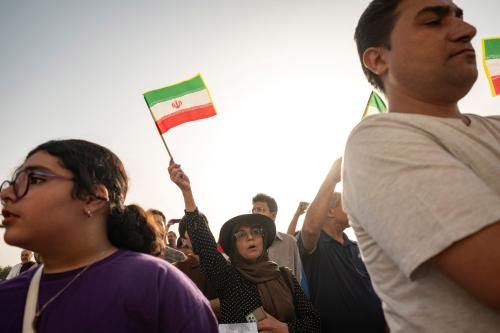Editor’s Note: As part of this year’s U.S.-Islamic World Forum, many of our participants are writing posts on Markaz to share their thoughts on one of the diverse topics discussed at the Forum. We hope you will join us by watching live webcasts from Doha, Qatar, on June 1-3, 2015, or following the conversation on Twitter with #USIslam15.
As the Kuwaiti state attempts to stem the tide of widespread calls for more representative government, the Kuwaiti Muslim Brotherhood, along with certain Salafi strands, has tempered its demands for social and cultural reforms that would “Islamize” Kuwaiti society— demands that it once prioritized. The government has recently hampered the broader political opposition’s reform efforts with repeated dissolutions of parliament (two in 2012 alone), the revision of electoral laws to favor traditionally pro-government candidates, and the shielding of ministers from interpellation to maintain al-Sabah ruling family’s primacy. In this context, the Kuwaiti Brotherhood’s political bloc, the Islamic Constitutional Movement (ICM), has excluded itself from the political system, boycotting the last two parliamentary elections. Outside of parliament, the ICM has increasingly privileged the advancement of a pro-democracy agenda, by forming coalitions and participating in protests with other opposition blocs, over its traditional demands for social reform such as restricting the sale of alcohol and backing gender segregation.
In early 2013, the ICM signed on to a 23-page document articulating demands for reform, drafted by secular opposition leader Musallam al-Barrak, former ICM parliamentarian Jamaʿan al-Harbash, and Tariq al-Mutairi of the liberal Civil Democratic Movement. Political trends ranging from secular leftists to Salafis have signed the document, which calls for an expanded parliamentary authority, an independent judiciary, and a modified criminal code— none of which is seen as a traditionally “Islamist” platform. A clampdown on opposition leaders— such as the recent sentencing of Al-Barrak to two years in prison for insulting the Kuwaiti emir— will likely push further opposition unity, and even moderation of Islamist platforms.
As part of the opposition coalition, the ICM dropped its once primary demand of amending article two of the constitution to proclaim shari‘a as the sole source of legislation. The bloc seems increasingly willing to work alongside other opposition movements to ensure at least limited political reform. A recent post on the ICM’s website by Islamist former MP Mubarak al-Duwailah explicitly calls for the setting aside of “traditional differences” in an effort to further the reform movement, suggesting efforts to temper ideological politics. Such opposition unity—previously seen in countries like Egypt and Tunisia before their governments were overthrown in 2011—has since the coup in Egypt in June 2013 and parliamentary elections in Tunisia in 2014, become increasingly uncommon. In Kuwait, in contrast, the ICM, along with al-Barrak’s Popular Labour Movement and the Salafi al-Umma Party have led the charge in continued protests this year against judicial corruption, while calling for new parliamentary elections and the release of political prisoners.
After Islamist actors came to the fore as governing parties following the Arab Spring, they came to be viewed as inflexible and insistent on advancing their own agenda, regardless of the demands of other opposition blocs with whom they had once allied. The Kuwaiti example, however, signals the privileging of broad-scale political reform above ideological agendas. This raises a series of questions. Does government exclusion in fact breed Islamist moderation in certain circumstances? In what environments does exclusion instead lead to Islamist violence? Do demands of Islamist blocs necessarily change depending on whether they are in opposition or in government? I look forward to addressing these questions, among others, at the 2015 U.S.-Islamic World Forum to gain a greater understanding of the behavior of political Islam in the post-coup era.
The Brookings Institution is committed to quality, independence, and impact.
We are supported by a diverse array of funders. In line with our values and policies, each Brookings publication represents the sole views of its author(s).




Commentary
Exclusion-Moderation: The emergence of Islamist cooperation with secular groups in Kuwait
May 22, 2015